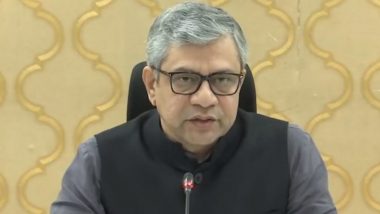
Union Railways Minister Ashwini Vaishnaw unveiled ambitious plans for the Indian Railways, emphasizing the completion of the KAVACH anti-collision system along the Mumbai-Delhi corridor by the fiscal year 2025. Speaking at a press briefing in New Delhi, Vaishnaw highlighted that 1,659 km of the route has already integrated KAVACH, with an additional 500 km slated for coverage by March 2023.
Aiming to intensify safety measures, Vaishnaw assured a comprehensive KAVACH installation on at least 5,000 km within the next three years. Addressing concerns sparked by reports of delayed KAVACH installations on new routes, officials disclosed ongoing efforts to secure Safety Integrity Level 4 (SIL) certification for the additional route, a milestone anticipated by March 2024.
SIL 4 certification, denoting the highest safety standard, guarantees a minimal error possibility—one in over 10,000 years—ensuring a robust safety infrastructure for rail travel.
Vaishnaw expressed the Railways’ intent to escalate KAVACH installation capacity from 1,500 to 2,500 km annually, aiming to achieve a significant milestone of 5,000 km per year by 2025-26.
In a move addressing wildlife protection, Vaishnaw introduced ‘Gajraj,’ an indigenous system developed to safeguard elephants along railway tracks. Implemented in the North Frontier Railways covering 14 elephant corridors, Gajraj, powered by Artificial Intelligence and optical fiber communication (OFC), boasts a 99.5% accuracy rate.
The system leverages pressure waves to detect elephant movements near tracks, alerting loco pilots to reduce speeds at least 200 meters ahead of the animal’s vicinity. Highlighting the plight of elephants, officials cited data indicating over 200 elephant fatalities in the last decade, primarily from West Bengal and Assam.
The Gajraj system utilizes existing OFC cables as sensors to identify elephant movements and swiftly alert station masters, loco pilots, and control offices, generating real-time alarms upon detection.
Vaishnaw also shed light on the Railways’ post-pandemic resurgence, revealing that passenger numbers escalated to 6.40 crore in FY 2023, with an anticipated 7.5 billion travelers by train in FY 24. He noted an increase in train operations from 10,186 pre-pandemic to 10,754 at present, showcasing a steady restoration of rail services in India.
Sources By Agencies




